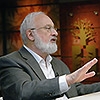 The point of an action is measured and evaluated only according to its intention. The intention to give more brings a person closer to the Creator, while the intention to receive more removes him from the Creator.
The point of an action is measured and evaluated only according to its intention. The intention to give more brings a person closer to the Creator, while the intention to receive more removes him from the Creator.
And in the middle between the intention to bestow and the intention to receive is a neutral, zero point from which a person decides where he is: in the spiritual or in the corporeal world.
The entire spiritual world operates in the intention to bestow, and as soon as we act egotistically, we immediately feel the corporeal world. How much to give and how much to receive is not so important anymore. The main thing that puts us on one or the other side of the border between spirituality and corporeality is our intention.
The main test is in what a person is yearning for, not how strong his desire is. A change of intention is like changing the car gear from forward to reverse depending on which I move forward, toward the Creator and the creatures, or backward.
The intention depends on where my heart is directed: outward toward others, toward the friends and through them to the Creator, or to myself. This determines where I go. Do I work for the Creator or for myself? Do I move toward my friends and through them toward the Creator or do I draw closer to myself? All this depends on the intention, and only after on the desire that obeys it.
To test the intention, one must distance himself from the action itself so that it becomes unimportant, and the main thing is: for whose sake am I doing this, and who will benefit from it. This determines whether I am in the Creator’s world or in my own world, in my shell.
The intention, directed outward or inward, divides my reality into two parts: a part that relates to me, meaning “I,” “mine,” and a part outside of me, meaning the friends and the Creator. If I want to exist in the Creator’s world and not in my small, animal world, then I must constantly check the direction of my thoughts.
The Book of Zohar says that people with an egoistic intention have their eyes looking inside themselves, they are completely blind and do not see the vast world around them. They cannot imagine anything but this world, and so they live in it and die.
This life is given in order to change the direction of one’s gaze from oneself outward and to reveal the world of the Creator called the upper world. And the lower world is the one that we see when we look inward at ourselves and care only for ourselves.
I must check where the vector of my thoughts and desires is directed—toward me, toward my benefit, or toward others and through them toward the Creator? That is, where is my heart reaching?
[272684]
From the 1st part of the Daily Kabbalah Lesson 10/21/20, Writings of Baal HaSulam, “The Love of God and the Love of Man”

No comments:
Post a Comment